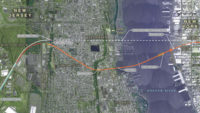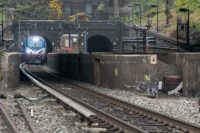After years of planning, engineering is underway for a 4.5-mile-long Hudson Tunnel Project between New York and New Jersey, following a grant from the Federal Transit Administration that could eventually reach $6.88 billion.
The Gateway Development Commission and the U.S. Dept. of Transportation announced the start of the tunnel's engineering phase on July 6. The commission estimates the total cost of the tunnel at $16.1 billion, while the Federal Transit Administration sets the figure closer to $17.2 billion.
“Our entire objective with this project is to plan slow, act fast and then get this project to a point of no return,” Gateway CEO Kris Kolluri says. “And I believe today is a significant step to getting this project to a point of no return.”
The $6.88-billion grant from the transit agency's Capital Investment Grants program would account for “the vast majority” of federal funding for the project, according to the commission, which was jointly created by New York and New Jersey to lead infrastructure projects between the states along the Northeast Corridor rail line.
Senate Majority Leader Chuck Schumer (D-N.Y.) was first to announce the funding amount on Twitter. He called the step “a giant leap forward” for the project, adding that it is the largest grant to date from the program.
The commission formally became the project sponsor last year, allowing it to seek federal funding. In addition to the grant funding, the commission expects to receive federal funding through the U.S. DOT's Rebuilding American Infrastructure with Sustainability and Equity program, plus grant programs of the Federal Railroad Administration’s Federal-State Partnership for Intercity Passenger Rail and Consolidated Rail Infrastructure and Safety Improvements.
The White House said in a statement that it expects there will be announcements later this year of projects selected for the intercity passenger rail grant program.
Amtrak is also helping fund the rail tunnel project, along with the Port Authority of New York and New Jersey, plus both state governments.
“The Hudson Tunnel project’s acceptance into the engineering phase of the Capital Investment Grant program has been years in the making, and we are thrilled to be even closer to the start of major construction on this critical Gateway Program project,” said Laura Mason, Amtrak executive vice president of capital delivery, in a statement.
Plans call for construction of a new two-tube, 2.4-mile rail tunnel to connect Secaucus Junction in New Jersey to Pennsylvania Station in Manhattan, plus related infrastructure work. Under the program, the 112-year-old North River Tunnel, which was damaged in 2012’s Superstorm Sandy, would also be rehabilitated. Construction of the new tunnel is scheduled for completion in 2035; the North River Tunnel rehab in 2038.
The commission says it is on schedule to start ancillary work on both sides of the Hudson River this year. In New Jersey, that will include work on a bridge over Tonnelle Avenue in North Bergen. In Manhattan, that includes work on concrete casings at Hudson Yards. Selection of a project delivery partner and the start of major construction are scheduled for next year.
In May, the commission shortlisted three teams for its project delivery partner, including a joint venture of Bechtel-HNTB; Hudson Delivery Partnership, a team of Atkins North America Inc., Arup US Inc. and The McKissack Group Inc.; and MPA Delivery Partners, consisting of Parsons Transportation Group of New York Inc, Arcadis of New York Inc. and Mace North America Ltd.
Procurement is underway for several pieces of the project. The commission has scheduled a virtual Palisades tunnel RFQ information session for July 13 and a Manhattan tunnel package procurement presentation July 25 at the Museum of Jewish Heritage in Manhattan. Any firms interested in attending the sessions can RSVP on the commission’s website.
The next phase of the grant program, expected to begin next year, would be negotiating a full-funding grant agreement between the transit agency and the commission. Congressional appropriation of the grant also is needed.
Amtrak owns the existing North River Tunnel, and New Jersey Transit trains also use it. Officials say more than 200,000 passenger trips are made through the tunnel on more than 400 trains daily, making it a critical link. But there are growing concerns over the tunnel's reliability. In 2020, maintenance issues caused more than 210 hours of delays for trains passing through it.
The new tunnel project is expected to support more than 72,000 jobs, according to U.S. DOT officials.
“This is a major step towards repairing our strained rail infrastructure and increasing regional connectivity to New York City and all of the economic and cultural opportunities that are available here,” said Carlo Scissura, president and CEO of the New York Building Congress, in a statement.






Post a comment to this article
Report Abusive Comment